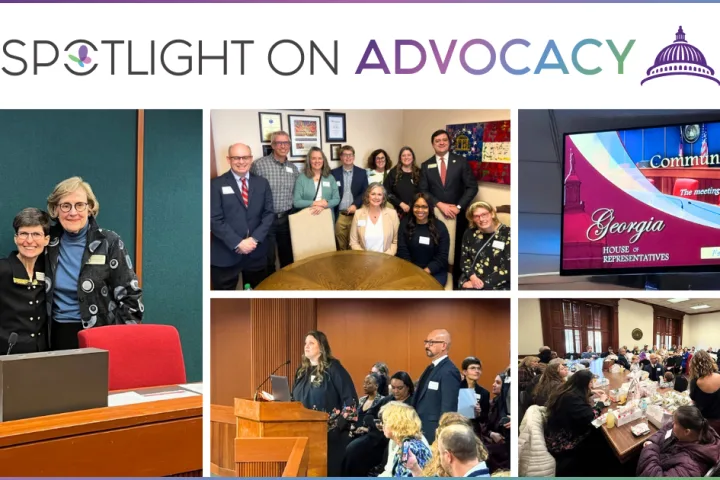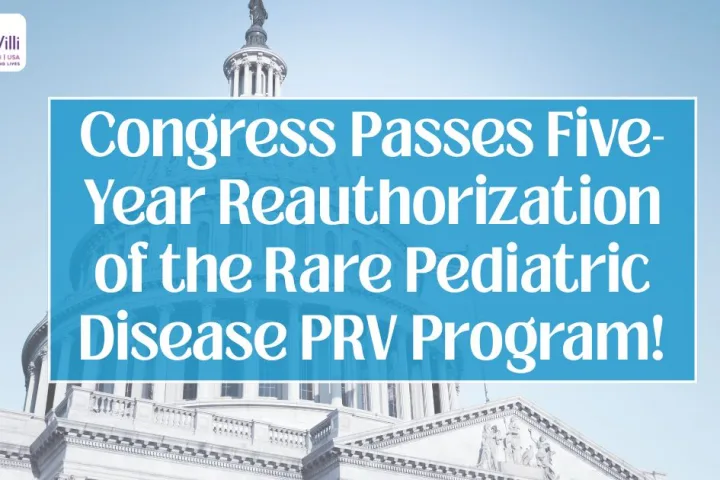Families across Wisconsin, especially those caring for loved ones with Prader-Willi syndrome (PWS), depend on reliable access to life-changing medications. But right now, many are facing barriers caused by unfair pharmacy benefit practices that raise costs and limit access to care.
That’s why PWSA | USA is urging Wisconsin families to speak up in support of Senate Bill 203 (SB 203). SB 203 is a bipartisan bill that would bring fairness, transparency, and accountability to an industry that has operated for too long without oversight.
What SB 203 Does
This bill tackles major problems families face when managing prescription medications:
Counts copay assistance toward deductibles.
If you receive copay help from a drug manufacturer or charitable program, those payments would finally count toward your deductible and out-of-pocket maximum – making it easier to afford necessary medication.
Stops hidden PBM fees and “clawbacks.”
Some Pharmacy Benefit Managers (PBMs) take money back from local pharmacies through secret fees. SB 203 ends these harmful practices that drive up costs and force independent and rural pharmacies to close.
Adds accountability and transparency.
PBMs would be required to act in the best interests of patients and disclose how they set prices. This would protect families from surprise costs and unfair denials.
Protects pharmacists and patient choice.
The bill ensures pharmacists can help patients find affordable options without being penalized by PBMs.
Why This Matters for the PWS Community
Families affected by PWS and other rare or chronic conditions often rely on high-cost or specialty medications that require consistent access. When PBMs remove drugs from formularies, block copay assistance, or add hidden fees, it can lead to treatment interruptions, unexpected bills, and dangerous gaps in care.
SB 203 protects access to critical medications and helps families avoid financial hardship so individuals with PWS can stay healthy and supported.
What’s Happening Now
SB 203 already has bipartisan support from 20 of 33 Wisconsin Senators, but we need 8 more Republican Senators to sign on before the bill can move to a floor vote on November 18.
How You Can Help
Your voice makes a difference, especially when legislators hear directly from families affected by rare diseases like PWS. Here’s how you can take action today:
1. Email your State Senator.
We’ve created a list of Wisconsin Senators who have not yet signed on as co-authors of SB 203 (as of November 6, 2025). Use this list to find your senator’s contact information and send them an email asking them to support SB 203. You can find this list by scrolling below.
2. Share your family’s story.
Explain how important consistent medication access is for your loved one with PWS. Real stories help legislators understand the human impact behind the policy.
3. Spread the word.
Post on social media, tag your representatives, and use the hashtags #FairAccessWI and #SupportSB203 to amplify the message.
Together, We Can Make a Difference
SB 203 is about fairness, accountability, and protecting Wisconsin families. By joining this effort, you’re helping ensure that people with PWS, and all patients with complex medical needs, can get the medications they rely on.
Let’s stand united for fair access to care and show Wisconsin lawmakers that patients come first.
Wisconsin State Senators
Not Co-Authors of SB 203 (as of Nov 6, 2025)
Julian Bradley Republican 28: Sen.Bradley@legis.wisconsin.gov
Dan Feyen Republican 20: Sen.Feyen@legis.wisconsin.gov
Dianne Hesselbein Democrat 27: Sen.Hesselbein@legis.wisconsin.gov
Rob Hutton Republican 5: Sen.Hutton@legis.wisconsin.gov
André Jacque Republican 1: Sen.Jacque@legis.wisconsin.gov
John Jagler Republican 13: Sen.Jagler@legis.wisconsin.gov
Chris Kapenga Republican 33: Sen.Kapenga@legis.wisconsin.gov
Devin LeMahieu Republican 9: Sen.LeMahieu@legis.wisconsin.gov
Rob Stafsholt Republican 10: Sen.Stafsholt@legis.wisconsin.gov
Patrick Testin Republican 24: Sen.Testin@legis.wisconsin.gov
Cory Tomczyk Republican 29: Sen.Tomczyk@legis.wisconsin.gov
Jamie Wall Democrat 30: Sen.Wall@legis.wisconsin.gov
Robert Wirch Democrat 22: Sen.Wirch@legis.wisconsin.gov
Share this!





 Perry A. Zirkel has written more than 1,500 publications on various aspects of school law, with an emphasis on legal issues in special education. He writes a regular column for NAESP’s Principal magazine and NASP’s Communiqué newsletter, and he did so previously for Phi Delta Kappan and Teaching Exceptional Children.
Perry A. Zirkel has written more than 1,500 publications on various aspects of school law, with an emphasis on legal issues in special education. He writes a regular column for NAESP’s Principal magazine and NASP’s Communiqué newsletter, and he did so previously for Phi Delta Kappan and Teaching Exceptional Children. Jennifer Bolander has been serving as a Special Education Specialist for PWSA (USA) since October of 2015. She is a graduate of John Carroll University and lives in Ohio with her husband Brad and daughters Kate (17), and Sophia (13) who was born with PWS.
Jennifer Bolander has been serving as a Special Education Specialist for PWSA (USA) since October of 2015. She is a graduate of John Carroll University and lives in Ohio with her husband Brad and daughters Kate (17), and Sophia (13) who was born with PWS. Dr. Amy McTighe is the PWS Program Manager and Inpatient Teacher at the Center for Prader-Willi Syndrome at the Children’s Institute of Pittsburgh. She graduated from Duquesne University receiving her Bachelor’s and Master’s degree in Education with a focus on elementary education, special education, and language arts.
Dr. Amy McTighe is the PWS Program Manager and Inpatient Teacher at the Center for Prader-Willi Syndrome at the Children’s Institute of Pittsburgh. She graduated from Duquesne University receiving her Bachelor’s and Master’s degree in Education with a focus on elementary education, special education, and language arts. Evan has worked with the Prader-Willi Syndrome Association (USA) since 2007 primarily as a Crisis Intervention and Family Support Counselor. Evans works with parents and schools to foster strong collaborative relationships and appropriate educational environments for students with PWS.
Evan has worked with the Prader-Willi Syndrome Association (USA) since 2007 primarily as a Crisis Intervention and Family Support Counselor. Evans works with parents and schools to foster strong collaborative relationships and appropriate educational environments for students with PWS. Staci Zimmerman works for Prader-Willi Syndrome Association of Colorado as an Individualized Education Program (IEP) consultant. Staci collaborates with the PWS multi-disciplinary clinic at the Children’s Hospital in Denver supporting families and school districts around the United States with their child’s Individual Educational Plan.
Staci Zimmerman works for Prader-Willi Syndrome Association of Colorado as an Individualized Education Program (IEP) consultant. Staci collaborates with the PWS multi-disciplinary clinic at the Children’s Hospital in Denver supporting families and school districts around the United States with their child’s Individual Educational Plan. Founded in 2001, SDLC is a non-profit legal services organization dedicated to protecting and advancing the legal rights of people with disabilities throughout the South. It partners with the Southern Poverty Law Center, Protection and Advocacy (P&A) programs, Legal Services Corporations (LSC) and disability organizations on major, systemic disability rights issues involving the Individuals with Disabilities Education Act (IDEA), Americans with Disabilities Act (ADA), and the federal Medicaid Act. Recently in November 2014, Jim retired.
Founded in 2001, SDLC is a non-profit legal services organization dedicated to protecting and advancing the legal rights of people with disabilities throughout the South. It partners with the Southern Poverty Law Center, Protection and Advocacy (P&A) programs, Legal Services Corporations (LSC) and disability organizations on major, systemic disability rights issues involving the Individuals with Disabilities Education Act (IDEA), Americans with Disabilities Act (ADA), and the federal Medicaid Act. Recently in November 2014, Jim retired.